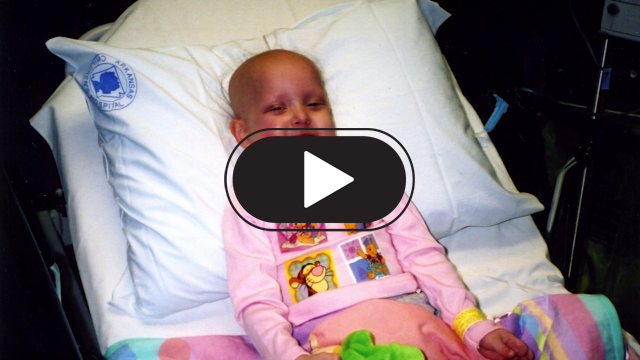Little Rock Christian Academy’s Justin Kramer and Family Champions Over Childhood Cancer
It was the last day of school. Justin Kramer’s wife Jill called him and asked him to come home. “Jayla’s limping and smiling funny,” she said, worried. Justin responded like most dads and coaches would respond; he assured her that Jayla was going to be fine. He thought surely she just hurt herself, the type of minor injury that comes from children playing. But when he arrived at home, expecting his three-year-old daughter to run and play chase with him as she did so often, he found something was in fact terribly wrong. “She had a severe noticeable limp, not like something was hurt, but like something didn’t work,” he recalls. When he caught her and picked her up, she giggled in his arms and he realized only “half of her face was laughing.”

Jill recognized the look on her husband's face and knew he was concerned as well. They began with a call to a friend, the doctor who delivered Jayla. He encouraged them to talk to a pediatric neurologist they knew, who advised them to go to the Arkansas Children’s Hospital emergency room.
“The hospital staff was awesome, but it was a long, weird night. Nothing happened like you would imagine…nothing like the movies,” Kramer expresses. A host of tests were run on Jayla, including an X-ray. The image displayed a cloud in the middle of her abdomen. The doctors said it was possibly cancer, but possibly not cancer, with no other options given. Within a couple of hours a leukemia diagnosis was reported to the Kramers. A little while after that it was categorized as T-cell acute lymphoblastic leukemia, which is one of the more common, treatable varieties of childhood cancers. Jayla’s thalamus gland was enlarged, which is a noticeable sign. She was between three and nine years of age. She was below a certain white blood cell count. All of the details of her case put her within the highest range of possible success.
Treatments began immediately and by mid-June her cancer was in remission. T-cell ALL is “bad about hiding in the brain and spine though,” Justin says. Jayla had to undergo years of chemotherapy and radiation. “There are some latent effects, but she works hard,” he affirms. The Kramers consider themselves “fixers,” so after the initial shock of their daughter’s diagnosis they went into problem solving mode. Justin relates cancer to a tornado: “It comes. It hits. You’re either left looking at the pieces, or you can start fixing it.”
The Kramers credit God, the LRCA family, their church, the town of Haskell, and friends and family with helping them make it through those years emotionally as well as financially. “You’re faced with so many decisions…selling your vehicles to make ends meet, and signing off on treatments that just about kill your child. You have to be willing to sacrifice so much for just the hope that things will be okay,” Justin shares. The Kramers are exceedingly thankful to everyone who helped them. Justin reminisces, “One of the best gifts we got was a bag of quarters which I thought was a little strange at the time, but it provided a sense of normalcy during those many hours and weeks in the hospital. We were able to just go get something from the vending machine, to go do something as simple as get a Coke when every other part of our lives was so complicated.” He says, “It’s not about the money, because honestly, the costs are so big there’s not enough. It’s about knowing you’re not alone, and that someone cares.”
Justin advises families who are going through situations like this to not try to do it all on their own. He also advises others to not let their loved ones try to do this on their own. Offering support can make all the difference. Also think twice about asking "how are you?" The simple question forces parents to dwell on or talk about potential negatives. Just let them know you are there for support and offer what help you can.
If you do not have a support system, get in touch with local resources, such as the American Childhood Cancer Organization of Arkansas and the American Cancer Society.
LRF: How did Jayla’s cancer impact you as a man and a coach?
JUSTIN: It changed me totally. I am more humble and compassionate. I even tear up at our annual football banquet. I was more cold and rigid before. It has helped me understand that coaching is not just about teaching football and winning games. It’s about helping my players become young men of character and integrity while hopefully winning some games too. Winning is not THE thing. It’s just A thing in the life classroom on the football field.
What kind of family life do you have?
We are a camping, hiking family. It’ about spending quality time and quantity time together. Jace and Jayla are only 18 months apart, so they became very close during the time of Jayla’s treatments. They weren’t able to really be around other children because of her hindered immune system. We are close, loving, and try to think of mistakes as learning opportunities.
September is Childhood Cancer Awareness Month. What does that mean to you and your family?
It’s not well known, and we need to fix that. Childhood cancers are the leading killers of kids. Half of those are leukemia. Arkansas Children’s Hospital is one of the best in the nation at fighting childhood cancer, and it’s in our community. They’re our kids. It’s not a small problem. Awareness, funding and research will increase survival rates so more kids like Jayla can celebrate each year of remission.
•••
American Childhood Cancer Organization of Arkansas' Gallery of Hope
Art auction benefitting Arkansas’ youngest cancer patients
Friday, September 7, 2012
6-8:30 p.m.
Arkansas Governor’s Mansion
For tickets or information call 420-4219
acco.org/arkansas



